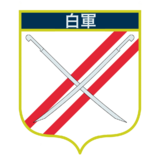Pelinese White Army (Pacifica)
| Pelinese White Army | |
|---|---|
| ベリナイ白軍 Пелиская Белая Армия ܟܘܿܫܘܼܢ ܦܲܠܸܢܵܝܬܵܐ ܚܘܵܪܬܵܐ | |
 Emblem of the Pelinese White Army | |
| Active | July 9, 1979 – present |
| Country | Kingdom of Pelinai |
| Branch | Army |
| Role | Land warfare |
| Size | 350,000 active personnel (2022 est.) |
| Part of | Pelinese Armed Forces |
| Headquarters | Ground Forces Staff Headquarters, Dainēsa |
| Patron | Saint Pelinai |
| Colors |
|
| March | March of the White Army |
| Equipment | |
| Engagements | |
| Website | pwa.mil.pln |
| Commanders | |
| Minister of Defense | Anton Radovoy |
| Chief of General Staff | Field Marshal Mikhail Yukisorskiy |
| Insignia | |
| Symbol / sleeve patch |  |
| Symbol (low visibility) |  |
| Alternate sleeve patch |  |
| Aircraft flown | |
| Attack helicopter | Ha-7 |
| Cargo helicopter | Ha-5 |
| Multirole helicopter | Be-12M, Be-14 |
The Pelinese White Army (Pelinese: ペリナイ白軍, Perinai Shiro Kano; Stelossian: Пелинская Белая Армия, Pelinskaya Belaya Armiya; Samaric: ܟܘܿܫܘܼܢ ܦܲܠܸܢܵܝܬܵܐ ܚܘܵܪܬܵܐ, Košun Palināytā Khwārtā), also referred to as the Pelinese Army (ペリナイ陸軍, Perinai Rikugun) or simply as the White Army (白軍, Shiro Kano), is the land warfare service arm of the Pelinese Armed Forces and is responsible for conducting ground combat operations. It is the largest branch of service under the Pelinese Armed Forces, with approximately 350,000 active duty personnel in 2022.
The Pelinese White Army has existed in various forms since July 9, 1979, when the Army of Pelinese Restoration and the National Revolutionary Brigades merged together shortly after the White Revolution and the outset of the Pelinese Civil War. The Pelinese White Army encompassed all aspects of warfare and functioned as the entire armed forces of the Pelinese Provisional Government and the restored Kingdom of Pelinai until the general governmental reorganization of 1983-1984 separated its naval, air, and militia elements into independent branches.
Mission
History
Preceding organizations
Pelinese Civil War
1983-1984 restructuring
Cold War
21st Century
Organization
Military districts
Force structure
Branches
Motor rifle
The Pelinese White Army Motor Rifle Corps retains administrative responsibility for the motor rifle personnel of the White Army, whose formations are the most numerous of its maneuver formation types and form the core of its land-based conventional combat power.
White Army motor rifle formations are heavily mechanized, combining a core infantry component with armored personnel carriers and infantry fighting vehicles, extensive organic artillery firepower, and fully towed and self-propelled CS and CSS elements to produce a highly mobile and tactically flexible fighting force capable of achieving rapid breakthroughs and quickly responding to changes in battlefield conditions.
The principal firearm of the Motor Rifle Corps is the AVP-17 6.5x50mmSR selective-fire assault rifle, while the standard issue sidearm is the Y93 5.7x28mm semi-automatic pistol. Other firearms carried by infantry personnel include the SVT designated marksman rifle and LPU light machine gun, while vehicle crews are issued the AP-1999 personal defense weapon. Commonly employed vehicles include the ZM97 Paladin infantry fighting vehicle and its variants, with support from vehicles such as the BRM-3 reconnaissance vehicle and the LVM-281 military light utility vehicle. 42 cohesive divisions are currently active under the Pelinese White Army, along with many brigade- and battalion-sized forces attached to provide combined arms support to armored and other maneuver forces; these forces together maintain a combined inventory of over 60,000 APCs, IFVs, IMVs, and other similar vehicles in active service or ready-to-use storage, along with a multitude of variants to provide C2 support and other functions.
Armor
The Armored Corps of the Pelinese White Army is the administrative branch responsible for overseeing the training and management of personnel assigned to operate armored fighting vehicles that provide maneuverable direct fire support to infantry forces. They are significantly less numerous than motor rifle forces in the Pelinese White Army, and are normally used as highly mobile, protected firepower to support combat and conduct rear-area raiding operations.
Pelinese line formations are always combined arms in nature in order to ensure adequate infantry support for the tanks, with the typical ratio of forces being 1:3 between motor rifle battalions and tank battalions for motor rifle formations. Tank formations closely resemble motor rifle formations with the exception of the tank/infantry subunit ratio, and thus receive much of the same combat support and combat service support as motor rifle forces: the primary differences between the two structures are the removal of some dedicated antitank units that are rendered unnecessary by the increased antitank capabilities of the core maneuver forces, as well as the exclusive usage of self-propelled artillery, antiaircraft weaponry, and other support firepower in order to maximize the operational mobility of the overall fighting force.
The primary armored fighting vehicle employed by the PWA Armored Corps is the T-04 Crusader main battle tank. Armored forces assigned to mountain, airborne, and armored reconnaissance units also utilize the LT-13 Kazak light tank and/or the BRM-3 armored amphibious reconnaissance vehicle. Supporting motor rifle, artillery, and other forces use similar equipment to that operated by their own dedicated units.
Artillery
The Artillery Corps of the PWA is the administrative branch responsible for establishment of artillery fire support units and the provision of personnel management, training, and other services to them. Artillery forces raised under this branch aid the effectiveness of friendly units and hinder hostile ones through the use of both direct and indirect land-based firepower capabilities against enemy targets of both tactical- and operational-level significance as necessitated by the present battlefield situation.
Artillery units are present in all heavy ground forces of brigade and division size, typically in the pattern of one unit per next unit or formation higher; motor rifle and tank divisions possess one artillery brigade operating both howitzers and rockets, while each motor rifle or tank brigade possesses a howitzer artillery battalion. Smaller units such as battalions and companies receive fire support from light weapons such as mortars instead. Tactical ballistic missiles are organized into brigades and attached at the field army level.
Units of the Artillery Corps operate the vast majority of the Pelinese White Army’s heavy direct fire support weaponry and virtually all of its indirect fires capability: this includes mortars, howitzers of both 105mm and 155mm caliber, rocket artillery systems, and tactical ballistic missile systems. Principal items of equipment include the AP-68 105mm light howitzer and AP-104 155mm howitzer, the ZMA-99, SGM-89, and SMA-97 155mm self-propelled artillery systems, the MRK-08 and MRK-89 self-propelled rocket artillery vehicles, and the Z17S/L Pyrope tactical ballistic missile system, as well as a variety of light, heavy, and self-propelled mortars.
Air defense
The Air Defense Corps of the Pelinese White Army is the PWA branch that administers troops tasked with performing air defense of military ground forces: this includes company-level and higher units providing tactical air defense from strike and other aircraft to maneuver forces, support forces, and army bases, but does not include area air defense units tasked with homeland protection.
In addition to being interspersed throughout combat support and combat service support formations, defense units are present in maneuver formations from battalion size upward. Smaller air defense units are assigned to battalions to provide short-range point air defense against helicopters and low-flying attack aircraft, while larger formations attached to divisions and above instead perform area air defense and air denial against threats such as cruise and tactical ballistic missiles, air superiority fighters, and strike aircraft flying at high altitudes.
The equipment of the Air Defense Corps is numerous in its intended role and primarily includes man-portable air defense systems, self-propelled anti-aircraft weapon systems, and SAM-carrying transporter erector launcher (TEL) and transporter erector launcher and radar (TELAR) systems, as well as a number of support vehicles and towed anti-aircraft artillery systems. Principal air defense systems include the Z29A/4 Onyx-G MANPADS, the T-19A Windshear self-propelled combined gun/missile air defense platform, and the Z830/2 Olivine TELAR system, while less-used systems include the ZTP-145, ZP-30-2, and ZP-57 towed anti-aircraft artillery mounts.
Army aviation
White Army Special Forces
Special troops
Services
Relationship with other organizations
Personnel
Ranks
Training
Pelinese White Army personnel, including both enlisted personnel and officers, receive continuous and rigorous training in military practices both before and during service, and are considered to be highly skilled by international standards. Officers in particular are expected to regularly attend professional development courses and participate in military exercises in order to remain in the military and attain promotions.
All Pelinese secondary school students aged 16-18 are required by law to complete 2 years of premilitary and military-technical training programs. These are administered through the Pelinese state secondary school system by the state-sponsored Pelinese National Sports-Technical Association (PNSTA) in cooperation with local PWA military districts, while the national Directorate of Military-Technical Training determines course content; course subjects include instruction in military regulations and operating procedures, training in the usage and maintenance of Pelinese military small arms such as the AVP-17 rifle and Y93 pistol, basic training in civil defense and first aid, as well as elective classes in a variety of specialist tasks. Completion of the full course is used as an equivalent to completion of the PWA-administered basic training course and allows for direct entry into the Army; this exemption is valid for up to five years after graduation from secondary school, after which point mandatory refresher classes must be taken by the applicant after recruitment.
Training for commissioned officers of the Pelinese White Army begins in either secondary school or tertiary education. Four specialist military high schools operate in Pelinai, with a total concurrent student capacity of approximately 5,000 students; attendees of these schools receive a more rigorous and intensive secondary education that includes a greater percentage of military-technical related subjects, and graduates benefit from automatic admission to any military college that they apply to. The Directorate of Military-Technical Training administers the commissioning program itself; individuals holding any 4-year university degree may apply and take examinations to become an army officer in the Pelinese White Army, though graduation from a dedicated military college is typically necessary due to the highly competitive nature of the selection process.
Contemporary topics
Strategic doctrine
Modernization
Equipment
Weapons
Individual weapons
The standard issue service rifle of the Pelinese White Army is the AVP-17 6.5x50mmSR infantry rifle, and the standard issue sidearm is the 5.7x28mm Y93 Pistol. Designated marksmen use the SVT and SV-93 7.62x54mmR designated marksman rifle and sniper rifle, while vehicle crews and rear area personnel use the AP-1999 5.7x28mm personal defense weapon and the SU-04 6.5x50mmSR carbine. The standard squad automatic weapon is the LPU 6.5x50mmSR belt-fed light machine gun, and the RPRU-4 is used as the standard anti-tank RPG launcher. The current standard anti-materiel rifle is the PBV-78A.
Crew-served weapons
The Pelinese White Army operates a variety of crew-served weaponry for use by ground troops, vehicles, and other platforms. The standard general-purpose machine gun of the PWA is the PF-96 7.62x54mmR GPMG. Heavy machine guns currently in use include the TPT-63 and TPA-15 12.7x108mm guns, as well as the KPY-74 14.5x114mm machine gun commonly mounted on vehicles. The main automatic grenade launcher of the PWA is the AG-40M.
Infantry equipment & uniforms
Vehicles
The Pelinese White Army has committed significant resources to the general mechanization of its forces, and maintains an exceptionally large inventory and variety of military vehicles. Its principal vehicle systems include the KMZ-145 family of 6x6 11-tonne general purpose utility trucks and associated trailers, the KMZ LVM-271 and LVM-281 military light utility vehicle families, the LPM-1 infantry mobility vehicle, the ZM97 Paladin 8x8 infantry fighting vehicle and its associated variant family, the T-04 Crusader main battle tank and its associated variant family, the UVBM-90 tracked vehicle family (including the ZMA-99 Druzhinnik self-propelled 155mm howitzer, the T-19A Windshear self-propelled anti-aircraft system, and others), the UTVM-13 8x8 wheeled vehicle family (principally used for some vehicles of the Z17S/L Pyrope tactical ballistic missile complex), and others. Military planners and procurement officials of the Pelinese White Army place a strong focus on simplifying logistics trains through the procurement of vehicle chassis designs with high degrees of reliability and adaptability of chassis to alternative roles; thus, many vehicle types in active use by the Pelinese White Army are variants or chassis conversions of one of a comparatively few base models.
Aircraft
The aircraft inventory of the Pelinese White Army consists primarily of rotary-wing platforms providing transport, reconnaissance, and ground attack capabilities, including the Be-12M, Be-14, Ha-5, and Ha-7. It additionally includes a small number of utility, SIGINT, and VIP transport aircraft, as well as a number of UAV systems such as the Yari and Kama 2 short- and long-range loitering munitions and the Ra-112 and Ra-120 ISTAR/EW platforms.
Inventory summary
| Item | In service | Major types | Notes |
|---|---|---|---|
| Tanks | ~28,500+ | T-04 Crusader, LT-13 Kazak | |
| Armored infantry fighting vehicles | ~31,000+ | ZM97 Paladin, VDM-12 Ritsr | |
| Other armored vehicles | ~20,000+ | BTP-03, LPM-01 | |
| Towed & self-propelled gun artillery | ~26,000+ | AP-68, AP-104, PTP-67, ZMA-99 Druzhinnik, SGM-89, SMA-97 | |
| Rocket artillery | ~4,500+ | MRK-08 Sunburn, MRK-89 Hyuga | |
| Attack helicopters | ~1,700 | Ha-7 | |
| Other helicopters | ~2,100 | Be-12M, Be-14, Ha-5 |
